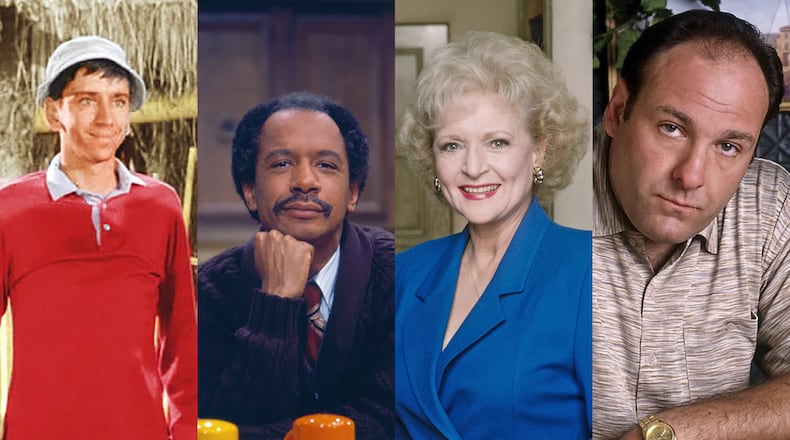The TV theme song is a sub-genre of music that has evolved over the years from largely orchestral instrumentals to jingle-like descriptive tunes to a broad array of styles and moods.
When there were only three networks and a few dozen shows, these songs became so deeply entrenched in the landscape, almost anyone of a certain age could sing the lyrics to “The Brady Bunch” or “Green Acres.”
But broadcast TV began scaling back the length of TV theme songs in the 1990s as pressures to place more ads grew. Many producers also began using existing pop songs instead of commissioning their own music.
In the 2000s, cable grew ascendant, and like the scripted shows themselves, added more texture and nuance to theme music. This past decade, streaming services have led to an even greater variance in the use and style of theme songs, some lasting just a few seconds — if used at all — while others going as long as two minutes. Netflix also added a feature that does not favor the comforting repetitiveness of a theme song while binging: “skip intro.”
1960s
Melissa’s picks: “The Monkees,” “The Flintstones,” “Bewitched”
Inspired by the Dave Clark Five, “(Theme From) The Monkees” was penned by Tommy Boyce and Bobby Hart, who became the primary songwriters for The Monkees with more hits including “Last Train to Clarksville.” The “modern Stone Age family” of "The Flintstones was introduced with a hooky gem from Hoyt Curtin and legendary animators William Hanna and Joseph Barbera with pop culture appeal stretching from movies (The B-52s covered it in 1994 for “The Flintstones” film) to slot machines. Fans of “Bewitched” almost heard Frank Sinatra’s “Witchcraft” as its theme, but the royalties were too steep, so an instrumental was installed instead. It might also be the only theme song in history to prominently include a xylophone — the signature sound that signaled Samantha’s (Elizabeth Montgomery) nose twitch.
Rodney’s picks: “Gilligan’s Island,” “The Addams Family,” “Mission: Impossible"
“Gilligan’s Island” creator Sherwood Schwartz wrote the lyrics into an insanely catchy song that defined the descriptive style of the time. “The Addams Family” follows a similar formula and adds delightfully memorable finger snaps to the earworm. “Mission: Impossible” was one of those propelling drama-filled instrumentals that captured the show’s spy thriller thematics with Bond-like charm.
1970s
Melissa’s picks: “The Mary Tyler Moore Show,” “Laverne & Shirley,” “Welcome Back, Kotter”
Mary Tyler Moore turned the world on with her smile, showed us how to properly toss a hat in the air and ideally represented Sonny Curtis' “Love Is All Around.” (The 1996 Joan Jett cover is also divine.) One-hit wonder Cyndi Grecco landed a Top 20 hit with “Making Our Dreams Come True,” the uplifting intro to the weekly shenanigans of Milwaukee’s favorite brewery workers. Schlemiel, Schlimazel, everyone! Former Lovin' Spoonful frontman John Sebastian brought “Welcome Back” to the top of the charts in 1976 with its sweet sentiment about coming home.
Rodney’s picks: ""All in the Family," “The Jeffersons,” “M*A*S*H”
“All in the Family” was a genre-busting sitcom, which also broke ground by featuring the two leads Archie Bunker (Carroll O’Connor) and Edith Bunker (Jean Stapleton) singing the nostalgic theme song “Those Were the Days” in their respective character styles. The theme song for spin-off “The Jeffersons” couldn’t be any more different, bringing gospel-tinged magic to the ode to the American Dream “Movin' On Up.” On the instrumental front, the “M*A*S*H” theme captured the darkness of war despite the comedic elements of the show, but it could have been even darker: the lyrical version of the song focused on suicide.
1980s
Melissa’s picks: “The Facts of Life,” “The Golden Girls,” “Miami Vice"
Written by Alan Thicke and then-wife Gloria Loring (who also sang the tune), “The Facts of Life” theme is a daily reminder that “you take the good, you take the bad, you take them both and there you have…the facts of life.” Andrew Gold had already charted in 1977 with the poignant “Lonely Boy,” but it was his minor 1978 hit, “Thank You For Being a Friend,” re-recorded by Cynthia Fee, that perfectly encapsulated the glory of Dorothy, Sophia, Rose and Blanche. “Miami Vice” was recognized as much for its soundtrack as it was slick pastels and Don Johnson’s stubble. Jan Hammer’s groundbreaking, Grammy-winning opening was the last instrumental to top the Billboard Hot 100 until 2013.
Rodney’s picks: “Cheers,” “The Love Boat,” “The Greatest American Hero”
The “Cheers” piano-heavy theme “Where Everybody Knows Your Name” opens with a melancholy verse about how tough life is but the uplifting chorus makes you want to yell out “Norm!” “The Love Boat” theme is even more welcoming courtesy of Jack Jones' mellifluous voice setting a course for adventure and your mind on a new romance. But the frivolity that personified a lot of 1980s TV is the pop-cheery Joey Scarbury’s No. 2 hit “Believe It or Not” from the goofy show “The Greatest American Hero.”
1990s
Melissa’s picks: “Frasier,” “The-X-Files,” “Ally McBeal”
Star Kelsey Grammer might not be the most polished singer, but his charming delivery of “Tossed Salads and Scrambled Eggs,” played over the closing credits, gives a show about two supercilious psychiatrists (Frasier also a talk radio star) a surprising Everyman bent. Composer Mark Snow took inspiration from The Smiths' “How SoonIs Now?” for “The X-Files” backdrop and not since “The Twilight Zone” had a psychological drama been accompanied by such ideally eerie music. Vonda Shepard achieved chart success in 1987 with her Dan Hill duet, “Can’t We Try.” But her role as resident bar performer on “Ally McBeal” and presenter of the opening “Searchin' My Soul” bumped her into pop-culture consciousness.
Rodney’s picks: “The Fresh Prince of Bel-Air,” “Beverly Hills 90210,” “Seinfeld”
Will Smith, who had already become a hip-hop star with “Parents Just Don’t Understand,” signed on for the NBC sitcom “Fresh Prince of Bel Air” in 1990 and created a broadcast TV-friendly theme song that was not like anything on the air at the time and remains a delight three decades later. At about the same time, another “fish out of water” concept created by Aaron Spelling debuted called “Beverly Hills 90210” with a weirdly catchy instrumental filled with Luke Perry-approved guitar riffs, distinctive claps and an underlying sweetness that personified the show itself. Over on the other coast in New York, the distinctive bass-heavy music behind “Seinfeld” was never included in a traditional opening sequence but embedded into Jerry Seinfeld’s stand-up routines and intros and outros of the show itself.
2000s
Melissa’s picks: “30 Rock,” “The Sopranos,” “Curb Your Enthusiasm”
Everything about the “30 Rock” theme — composed by star Tina Fey’s husband, Jeff Richmond — feels like New York. It’s spry, jazzy and comes with a perfectly timed horn bleat in the opening credits. One thing about Tony Soprano, he was a brooder. And British band A3 (known in their homeland as Alabama 3) provided a tense, throbbing musical complement with “Woke Up This Morning,” originally on their 1997 “Exile on Coldharbour Lane” album. Considering the constant neurosis of Larry David, the circus-like “Curb” theme — the instrumental “Frolic” by Italian composer Luciano Michelini — is an even funnier contradiction to David’s relatable kvetching.
Rodney’s picks: “Gilmore Girls,” “The O.C.,” “The Big Bang Theory”
“Gilmore Girls” used a sentimental early 1970s Carole King song and successfully changed its meaning to focus on the mother-daughter connection on the show. Following the lead of many other shows of that era, The millennial-friendly relationships drama “The O.C.” chose a plaintive 2002 Phantom Planet song, “California,” that wasn’t a hit stateside but ultimately sold 500,000 copies. An taking the opposite tack in pacing, Canadian pop duo The Barenaked Ladies squeezed the history of earth and man into a mere 20-second intro window with this fast-paced ditty for “The Big Bang Theory.”
2010s
Melissa’s picks: “Orange is the New Black,” “Young Sheldon,” “Brooklyn Nine-Nine”
Regina Spektor’s “You’ve Got Time” — composed specifically for the breakout Netflix hit — is discordant and abrasive and well-suited to a show about a women’s prison and all of its colorful characters and tribulations. The namesake of “Young Sheldon,” who would grow up to become “The Big Bang Theory”'s lovable and infuriating Brainiac, is equal parts adorable and exasperating as a kid; Steve Burns' “Mighty Little Man” reminds us that “young” Sheldon is just a little guy in a bow tie. Serious police procedurals have given us many a memorable theme (“Hill Street Blues,” “S.W.A.T.”), but the gang at “Brooklyn Nine-Nine” routinely teeter between thoughtful and silly, a dichotomy well-represented by the retro-tinged opening by composer Dan Marocco.
Rodney’s picks: “The Walking Dead,” “Mad Men,” “Unbreakable Kimmy Schmidt”
Composer Bear McCreary gives “The Walking Dead” theme the proper level of dread and fear with a minimalistic, often dissonant instrumental that insinuates itself into the brain like a virus. It pairs nicely with the theme to “Mad Men,” a hauntingly morose, mysterious tune that perfectly personifies 1960s ad man Don Draper and is a rearranged version of an obscure rap song creator Matthew Weiner heard between stories on NPR’s “Marketplace.” Then for pure, gooey goodness, there’s the unusual theme song to “Unbreakable Kimmy Schmidt,” where a chipper melody is wrapped around an auto-tuned witness in a new story describing the premise of the show about a woman rescued from an underground cult.
Keep Reading
The Latest
Featured




